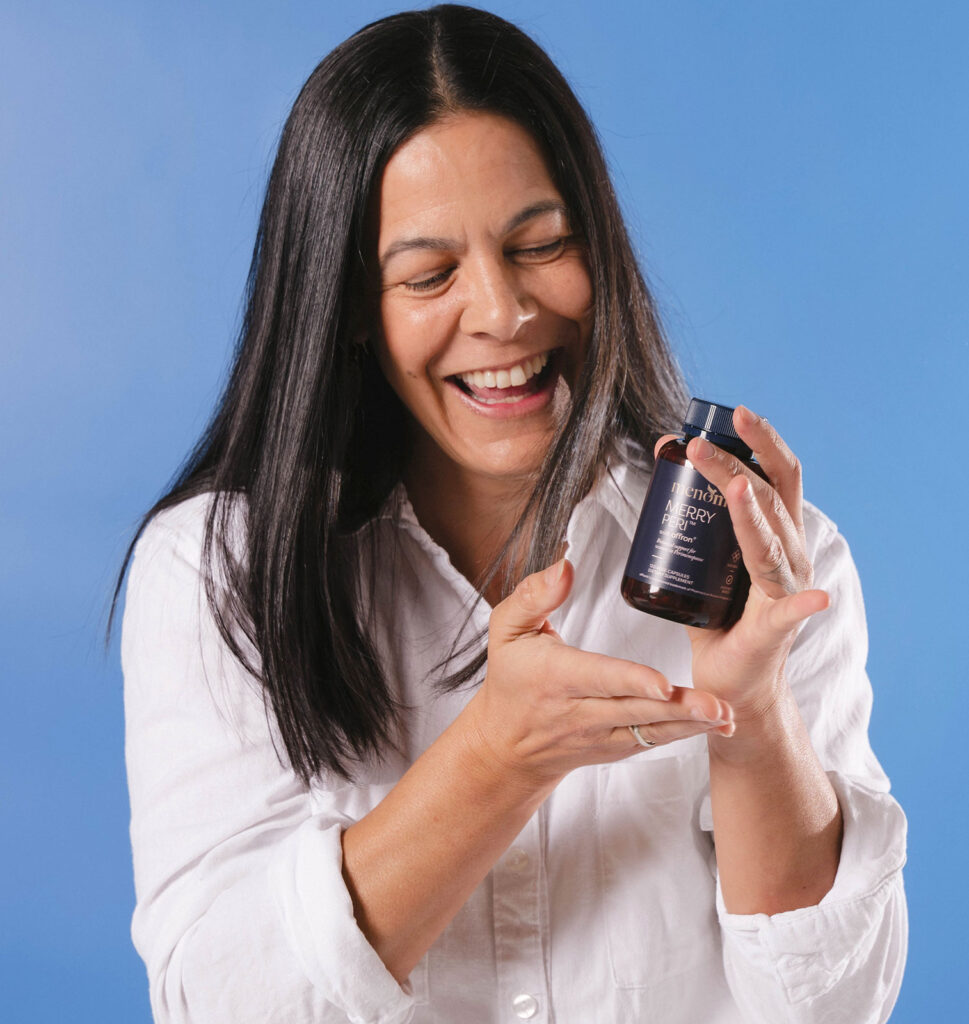OK, let’s be honest – menopause mood swings are real. The truth is, menopause doesn’t just mess with your thermostat (hello, surprise hot flushes at the worst possible moments), it also decides to throw your emotions into a blender and hit high. So, one minute you’re crying at a toilet paper commercial, the next you’re ready to throw your partner’s dirty socks out the window along with your significant other.
Indeed, if you’ve found yourself wondering whether aliens have hijacked your brain, you’re not alone. The mental and emotional rollercoaster of menopause is real and frustrating. And seriously, it can feel like nobody warns you just how wild this ride gets for some of us. So, between the mood swings, anxiety, and brain fog, it’s no wonder so many of you feel like you’re losing your mind.
But here’s the good news: understanding what’s happening to your menopausal brain is the first step to getting back in the driver’s seat. And, don’t worry, we’ve got a few evidence-backed tools to add to your arsenal.
What’s Really Going On With Menopause Mood Swings
OK, so think of your brain as having been on a nice, steady hormone diet for decades (aside from PMS and pregnancy if they’ve been part of your world).

No doubt, the two major sex hormone players – estrogen and progesterone – have been keeping things on a fairly even keel. So you’ve had smooth sailing, a sharp memory, lubricated joints and your ability to find your keys. But then perimenopause crashes the party.
Because during peri, your hormones basically decide to play hide and seek. So one day, estrogen might decide to show up 100%; the next day, she’s on go-slow sending estrogen-progesterone ratios way out of whack.
This hormonal chaos explains the mood swings and why you might feel perfectly fine one moment and then want to ugly-cry at a coffee ad the next. Your brain is just trying to figure out how to function.
Why Does Menopause Turn Your Brain Into a Moody Teenager?
The Hormone-Brain Connection
Let’s start with what’s happening to progesterone and estrogen. Because understanding why your brain seems to be going haywire makes everything feel less like you’re going mad.
Progesterone: Your Former Chill Pill
Progesterone is your natural anxiety buffer and sleep supporter. But as a result of its decline (around your mid-30s), you might find yourself lying awake at 3am worrying about things that haven’t happened yet, or feeling anxious about situations that previously wouldn’t have fazed you.
Estrogen: The Mood Stabiliser You Never Knew You Had
Meanwhile, estrogen has been quietly working behind the scenes as your personal mood manager, regulating serotonin and dopamine (your happy chemicals) along with other neurotransmitters that keep you feeling human. But when estrogen starts its rollercoaster exit during perimenopause, your brain chemistry can go out of kilter.
The Mental Health Hall of Fame
As a result, you might experience:
- Mood Swings – one minute you’re fine, the next you’re ready to start a fight with anything and anybody.
- Anxiety – hello, racing heart at the grocery store (can you relate?!) Many women experience anxiety for the first time during menopause, or find their existing anxiety goes into overdrive.
- Brain Fog – walking into rooms and forgetting why, losing words mid-sentence, feeling like your mental processor is running slow – this is brain fog.
- Depression – and not just sadness, but that heavy, grey feeling that makes everything feel harder than it should be.
- Sleep Issues – night sweats or your brain deciding 2am is the perfect time for deep philosophical thoughts.
7 Evidence-Backed Strategies to Tame Mood Swings During Menopause
1: Mindfulness
Your stress response system is basically a smoke detector going off – everything feels super magnified.
The Fix:
- Meditation apps aren’t just for yogis: begin with 5 minutes daily – try Headspace, Calm, or Insight Timer
- Breathwork: we swear by the 4-7-8 method (inhale for 4, hold for 7, exhale for 8) – it’s like a reset button for your nervous system
- Try the “STOP” method – think of it as a mini timeout before you say something you’ll regret later:
- Stop what you’re doing
- Take a breath
- Observe how you’re feeling
- Proceed with intention
- Progressive muscle relaxation: tense and release muscle groups from toes to head – it’s surprisingly effective for helping you chill
Why It Works: Mindfulness literally rewires your brain’s stress response. MRI studies show regular meditation increases grey matter in areas responsible for emotional regulation.

2: Exercise Your Way Out Mood Swings
Because exercise is probably the closest thing we have to a magic pill for mental health during menopause.
Best Mental Health Workouts:
- Cardio: 30 minutes of brisk walking, swimming, or dancing (yes, kitchen dancing counts) most days
- Strength training: 2-3 sessions weekly – lifting weights lifts moods
- Yoga for the win: Combines movement with stress reduction and helps with that flexibility you’re definitely going to need
The Science: Exercise increases BDNF (brain-derived neurotrophic factor), which is like fertiliser for your brain cells. It also boosts endorphins, improves sleep quality, and helps regulate those rebellious hormones.
3: Sleep Hygiene

While you may have heard some poo-pooing it, sleep hygiene can be your BFF, especially if hormonal shifts are causing chaos.
Sleep Solutions:
- Temperature control: keep it cool (18-20°C)
- Invest in moisture-wicking sheets and sleepwear: because nobody wants to deal with 3am sheet changes
- Create a wind-down routine: your brain needs time to shift gears from “go mode” to “sleep mode”
- Screen curfew: blue light before bed can play havoc
Download our free sleep sheet here
4: Food as Medicine
Your brain needs fuel, and during menopause, it becomes particularly picky about what you feed it.
Mood-Supporting Foods:
- Omega-3 powerhouses: salmon, sardines, walnuts
- Leafy greens: spinach, kale, rocket – folate for the win
- Complex carbs: sweet potatoes (kumara), quinoa, oats
- Fermented friends: yoghurt, kefir, sauerkraut – your gut bacteria will thank you
Foods That Don’t Help:
- Caffeine after 2pm: because anxiety doesn’t need an energy drink
- Alcohol: it might help you fall asleep, but the liver doesn’t like it, and it practically guarantees poor sleep quality
- Sugar rollercoaster: what goes up must come crashing down (taking your mood with it)

Tip: Get your blood markers checked, particularly including vitamin D, B12, ferritin and triglycerides – if they’re not optimal (higher end of the range) they can impact your mood.
5: Build Your Support Squad
The truth is, this isn’t the time to be a loner. In fact, navigating menopause successfully is easier when you talk to others who “get it”. You need people who understand that your crying over an ad about dog food is completely reasonable.
Here’s how:
- Find your group: such as online communities (here’s a link to our 40+ Ageless Goddesses group), or strike up conversations with friends of a similar age
- Professional backup: we have 30 and 60-minute Meno Coaching sessions with Jenna, our menopause coach and lifestyle medicine practitioner here.
- Family education: help your loved ones understand this isn’t just “being dramatic”
6: Self-Care (That’s Not Bath Bombs)
During menopause, self-care isn’t about perfect Instagram moments – it’s about survival and sanity.
Helpful Self-Care:
- Journaling: getting thoughts out of your head and onto paper is surprisingly therapeutic – it’s called a brain dump
- Nature therapy: even 10 minutes outside can reset your nervous system
- Saying no: it might feel tricky, but your energy is precious right now
- Scheduling joy: literally put enjoyable activities on your calendar like unmissable appointments
7: Track Your Patterns
As we always say, knowledge is power, especially when dealing with unpredictable symptoms.
What to Monitor:
- Mood patterns: are there triggers? Times of day? Cyclical patterns?
- Sleep quality: how much you’re getting vs how you feel
- Physical symptoms: what are you experiencing?
- Stress levels: what sends you over the edge these days?
- Food and mood connections: does that afternoon cookie crash coincide with irritability?
Your Dream Team:
Merry Peri®, Perky Post®, and Happy Go Tummy®
You can think of these evidence-based natural supplements as your personal support crew, each with its own specialty in keeping you feeling more like yourself. What’s more, they’re created by women for women who have been – or are going through – this journey too.
Merry Peri®: Your Perimenopause Mental Health Sidekick
Let’s be honest – perimenopause can be like being stuck in weather that changes every five minutes – one day you’re fine, the next you’re googling “can you die from mood swings?”.
That’s why Merry Peri® is specifically formulated for perimenopause. Indeed, the affron® saffron is calming and acts like a sleep balm, while sage and fenugreek make up the magical trio of ingredients.
How It Helps Your Sanity:
- Mood stabilisation: helps smooth out emotional peaks and valleys
- Stress resilience: because everything feels like a bigger deal right now
- Mental clarity: for when you need to remember why you walked into the kitchen
- Emotional regulation: supporting your brain’s ability to respond rather than react
Perfect For: Women who are in the thick of perimenopause and feeling the rollercoaster of mood swings.
Perky Post®: Mental Clarity for Your New Normal
Once you’ve officially crossed into post-menopause territory (congratulations, you made it through peri!), your brain needs different support. You might have fewer dramatic mood swings, but brain fog and low energy can stick around like uninvited houseguests.
Perky Post® recognises that the post-menopausal brain is working with an altered hormonal landscape. So, in addition to affron® saffron, sage and fenugreek, it also contains vitamin D3, K2 and reseveratrol.
Mental Health Support Features:
- Cognitive function: keeping your brain sharp and focused
- Sustained mental energy: without the jittery feeling of too much caffeine
- Ongoing stress management: because life doesn’t stop being stressful after perimenopause
- Emotional stability: supporting consistent mood and wellbeing
Ideal For: Post-menopausal women who want to feel mentally sharp and emotionally balanced.
The Brain-Gut Connection
Your Gut: The Second Brain You Never Knew You Had
Here’s something that might surprise you: your gut health has a direct line to your brain, and menopause can mess with this important connection.
The gut-brain axis is a sophisticated communication network that influences everything from your mood to your ability to handle stress. And during menopause, hormonal changes can disrupt the delicate balance of gut bacteria, potentially affecting the production of mood-regulating neurotransmitters like serotonin. And hello, mood swings!
Fun fact: about 90% of your body’s serotonin is actually made in your gut, not your brain.
Happy Go Tummy® supports this by promoting optimal digestive health, which creates better conditions for neurotransmitter production and overall mental wellbeing. And when your gut is happy, your brain is more likely to be happy too.
Digestive support becomes especially important during menopause when many women suddenly develop food sensitivities they’ve never experienced before, or when stress manifests as digestive issues. So, by supporting gut health, Happy Go Tummy® contributes to the overall wellness picture in ways that extend far beyond just feeling comfortable after meals.
Happy Go Tummy®: The Gut-Brain Peace Treaty
Understanding your digestive system and mental health are connected is key. Enter Happy Go Tummy® – it’s a synbiotic, which means it’s a powerful prebiotic/probiotic combination.
Mental Health Benefits Through Gut Love:
- Serotonin optimisation: supporting your gut’s ability to produce mood-regulating neurotransmitters
- Inflammation reduction: less gut inflammation = less brain fog and mood instability
- Better nutrient absorption: your brain gets the vitamins and minerals it needs
- Comfort and confidence: when your gut feels good, you feel better overall
The Ripple Effect: When your digestive system is happy, you stop needing to worry about bloating, discomfort, and digestive unpredictability (embarrassing puffs, anyone?!) This reduces background stress and anxiety, freeing up mental energy for more important things – like remembering where you put your keys!
Frequently Asked Questions
How long will I feel like this?
Mood swings typically start in perimenopause (which can last anywhere from 4-10 years – sorry!) and usually settle down within the first few years of post-menopause. With the right support strategies, most women see significant improvement within 3-6 months. Hang in there – this too shall pass.
Is it normal to have anxiety during menopause when I never had it before?
Absolutely. Hormonal changes can trigger anxiety in women who’ve never experienced it or make existing anxiety worse. It’s not a character flaw or sign of weakness – it’s biochemistry.
Will my brain ever work properly again?
Yes! While menopause brain fog is real and frustrating, it’s typically not permanent. Your brain is amazingly adaptable, and with proper support (nutrition, exercise, sleep and appropriate supplements), most women see significant cognitive improvement.
When should I call in professional reinforcements?
Seek help if you experience depression lasting more than two weeks, thoughts of self-harm, panic attacks that interfere with daily life, or symptoms that significantly impact your relationships or work. There’s no shame in getting professional support – it’s actually smart.
What’s the difference between perimenopause and post-menopause mood stuff?
Perimenopause is like being on an emotional roller coaster – lots of dramatic ups and downs. Post-menopause symptoms tend to be more stable but can include persistent brain fog or a general “meh” feeling due to lower hormone levels.
Can changing what I eat really help my mood?
Absolutely. Your brain is an energy-hungry organ that’s very particular about its fuel – and it doesn’t thrive on junk food. In addition, anti-inflammatory foods, stable blood sugar, adequate protein, and gut-supporting nutrients can dramatically impact how you feel mentally and emotionally. In fact, we offer all of these in our Shake It Off® 10-Day Hormone Reset, which also puts you on the path to fitting your jeans again. Click here to discover more.
Your Personalised Mental Health Game Plan (Because One Size Fits None)
Phase 1 (Weeks 1-2): Foundation Building
- Start symptom tracking: Knowledge is power, and patterns are helpful
- Evaluate supplement needs: Merry Peri® for perimenopause or Perky Post® for post-menopause support
- Implement sleep hygiene basics: Your brain needs quality rest to function
- Begin a simple mindfulness practice: Even 5 minutes counts
- Schedule a support appointment: seeking support and guidance for your specific situation is smart thinking
Phase 2 (Weeks 3-4): Add Movement and Nutrition
- Establish consistent movement: Find exercise you actually enjoy
- Focus on brain-supporting nutrition: Feed your mind well
- Consider gut health support: Happy Go Tummy® can help optimise that brain-gut connection, so can Shake It Off® 10-Day Hormone Reset
- Build your support network: You’re not meant to do this alone
Phase 3 (Weeks 5-8): Targeted Support
- Refine your self-care routine: What’s working? What isn’t?
- Address persistent symptoms: Professional help isn’t giving up
- Celebrate wins: Acknowledge your progress, even the small stuff
The Bottom Line
Whether you find relief through lifestyle changes, natural supplements such as Merry Peri®, Perky Post®, and Happy Go Tummy®, group or 1-1 support, or a combination of approaches, the important thing is that you’re taking action. Because mood swings are nobody’s friend and your mental health matters, what you experience is valid, and you deserve support during this transition.
So, why not pick one or two strategies from this guide and start today?
Share with a friend
Sign up to our mailing list for the latest news and stories and receive a $5 discount code to redeem on your first purchase, plus receive a 3-step eBook on ways to support your body through menopause.
This site is protected by reCAPTCHA and the Google Privacy Policy and Terms of Service apply.
Related Articles
Disclaimer: This information is for educational purposes and shouldn’t replace professional medical advice. Always consult with your healthcare provider before making significant health changes. We know our stuff, but we’re not your doctor.
And just so you know: this article is written by a real person who has studied the physiology of menopause and women’s healthy ageing. While we may use AI as an assistant, the research, insights and heart behind every piece comes from us.
References
- Freeman, E. W., Sammel, M. D., Lin, H., & Nelson, D. B. (2006). Associations of hormones and menopausal status with depressed mood in women with no history of depression. Archives of General Psychiatry, 63(4), 375-382.
- Maki, P. M., & Henderson, V. W. (2012). Hormone therapy, dementia, and cognition: the Women’s Health Initiative 10 years on. Climacteric, 15(3), 256-262.
- Hölzel, B. K., Carmody, J., Vangel, M., et al. (2011). Mindfulness practice leads to increases in regional brain gray matter density. Psychiatry Research: Neuroimaging, 191(1), 36-43.
- Schuch, F. B., Vancampfort, D., Richards, J., et al. (2018). Exercise as a treatment for depression: A meta-analysis adjusting for publication bias. Journal of Psychiatric Research, 77, 42-51.
- Yano, J. M., Yu, K., Donaldson, G. P., et al. (2015). Indigenous bacteria from the gut microbiota regulate host serotonin biosynthesis. Cell, 161(2), 264-276
- Weber, M. T., Maki, P. M., & McDermott, M. P. (2014). Cognition and mood in perimenopause: a systematic review and meta-analysis. Journal of Steroid Biochemistry and Molecular Biology, 142, 90-98.
- Baker, F. C., de Zambotti, M., Colrain, I. M., & Bei, B. (2018). Sleep problems during the menopausal transition: prevalence, impact, and management challenges. Nature and Science of Sleep, 10, 73-95.
- Lai, J. S., Hiles, S., Bisquera, A., et al. (2012). A systematic review and meta-analysis of dietary patterns and depression in community-dwelling adults. American Journal of Clinical Nutrition, 99(1), 181-197.
- Foster, J. A., & McVey Neufeld, K. A. (2013). Gut-brain axis: how the microbiome influences anxiety and depression. Trends in Neurosciences, 36(5), 305-312.







